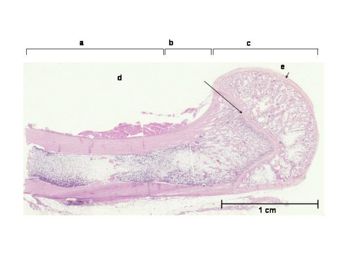Difference between revisions of "Bones and Cartilage Flashcards - Pathology"
Jump to navigation
Jump to search
| Line 7: | Line 7: | ||
* D. Epiphyseal growth plate | * D. Epiphyseal growth plate | ||
* E. Articular cartilage | * E. Articular cartilage | ||
| − | |l1=Bones - | + | |l1=Bones - Anatomy & Physiology |
|q2=Which cells produce osteoid? | |q2=Which cells produce osteoid? | ||
|a2=Osteoblasts | |a2=Osteoblasts | ||
| − | |l2=Bones - | + | |l2=Bones - Anatomy & Physiology |
|q3=True or False - Cancellous bone forms Haversian systems? | |q3=True or False - Cancellous bone forms Haversian systems? | ||
|a3=False | |a3=False | ||
| − | |l3=Bones - | + | |l3=Bones - Anatomy & Physiology |
|q4=Which developmental disorder is considered normal in some breeds of dog, eg. skulls of Pekingese and Bulldogs or the limbs of Dachshunds and Bassett hounds? | |q4=Which developmental disorder is considered normal in some breeds of dog, eg. skulls of Pekingese and Bulldogs or the limbs of Dachshunds and Bassett hounds? | ||
|a4=Chondrodysplasia | |a4=Chondrodysplasia | ||
Revision as of 17:38, 27 February 2011
| Question | Answer | Article | |
| What do the letters represent with respect to the image shown below? |
|
Link to Article | |
| Which cells produce osteoid? | Osteoblasts
|
Link to Article | |
| True or False - Cancellous bone forms Haversian systems? | False
|
Link to Article | |
| Which developmental disorder is considered normal in some breeds of dog, eg. skulls of Pekingese and Bulldogs or the limbs of Dachshunds and Bassett hounds? | Chondrodysplasia
|
Link to Article | |
